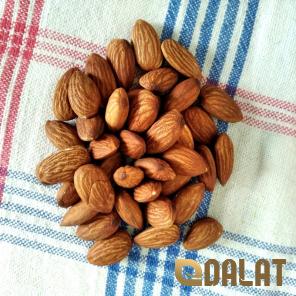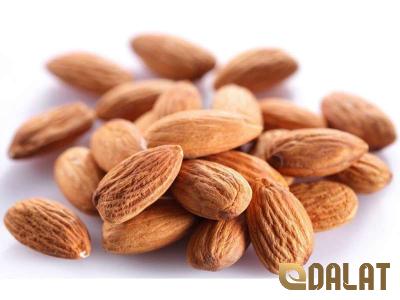In the world of dentistry, we often focus on traditional oral care routines such as brushing, flossing, and regular dental check-ups. However, have you ever considered the impact of almonds on your dental health? Almonds are not only a tasty and nutritious snack, but they also offer a myriad of benefits for your teeth and gums. In this comprehensive guide, we will delve into the world of almond dental health to uncover the secrets behind this humble nut’s remarkable properties. **The Nutritional Powerhouse of Almonds** Almonds are widely regarded as a nutritional powerhouse, packed with essential nutrients that support overall health and well-being. From vitamin E and magnesium to fiber and protein, almonds offer a range of benefits for your body. But what about dental health? How do the nutrients in almonds contribute to a healthy smile?

.
 **Almonds and Oral Health: The Connection** When it comes to oral health, almonds play a crucial role in maintaining a healthy and vibrant smile. The high levels of calcium and magnesium in almonds help to strengthen teeth and bones, while the vitamin E and antioxidants promote healthy gums and prevent gum disease. Additionally, the natural oils present in almonds help to reduce bacteria in the mouth, preventing cavities and decay. **The Benefits of Almonds for Teeth and Gums** 1. **Strengthens Teeth**: The calcium and magnesium content in almonds helps to strengthen tooth enamel, reducing the risk of tooth decay and erosion. 2. **Promotes Healthy Gums**: Vitamin E and antioxidants in almonds support gum health by reducing inflammation and preventing gum disease. 3. **Fights Bacteria**: The natural oils in almonds have antibacterial properties that help to combat harmful bacteria in the mouth, reducing the risk of cavities and gum disease. 4. **Freshens Breath**: Almonds can help freshen breath by neutralizing odor-causing bacteria in the mouth, leaving you with a clean and fresh feeling.
**Almonds and Oral Health: The Connection** When it comes to oral health, almonds play a crucial role in maintaining a healthy and vibrant smile. The high levels of calcium and magnesium in almonds help to strengthen teeth and bones, while the vitamin E and antioxidants promote healthy gums and prevent gum disease. Additionally, the natural oils present in almonds help to reduce bacteria in the mouth, preventing cavities and decay. **The Benefits of Almonds for Teeth and Gums** 1. **Strengthens Teeth**: The calcium and magnesium content in almonds helps to strengthen tooth enamel, reducing the risk of tooth decay and erosion. 2. **Promotes Healthy Gums**: Vitamin E and antioxidants in almonds support gum health by reducing inflammation and preventing gum disease. 3. **Fights Bacteria**: The natural oils in almonds have antibacterial properties that help to combat harmful bacteria in the mouth, reducing the risk of cavities and gum disease. 4. **Freshens Breath**: Almonds can help freshen breath by neutralizing odor-causing bacteria in the mouth, leaving you with a clean and fresh feeling.
..
 **Incorporating Almonds into Your Dental Care Routine** Now that we understand the benefits of almonds for dental health, how can we incorporate this nutritious nut into our daily oral care routine? Here are some simple yet effective ways to harness the power of almonds for a healthier smile: 1. **Snack Smart**: Instead of reaching for sugary or acidic snacks, opt for a handful of almonds as a tooth-friendly alternative. Almonds are low in sugar and high in nutrients, making them an ideal choice for maintaining oral health. 2. **Almond Butter**: Swap out sugary spreads for almond butter, a delicious and nutritious alternative that can be enjoyed on toast, crackers, or as a dip for fruits and vegetables. Almond butter is not only tasty but also promotes dental health with its beneficial nutrients. 3. **Almond Milk**: Replace cow’s milk with almond milk in your morning cereal or smoothie for a dairy-free and tooth-friendly option. Almond milk is rich in calcium and vitamin D, essential nutrients for strong teeth and bones. 4. **Almond Flour**: Incorporate almond flour into your baking recipes as a healthier alternative to traditional flour. Almond flour is gluten-free and low in carbohydrates, making it a tooth-friendly choice for your favorite treats. 5. **Almond Oil Pulling**: Try oil pulling with almond oil to promote oral health and hygiene. Swishing almond oil in your mouth for a few minutes each day can help reduce bacteria, prevent cavities, and freshen breath. **Conclusion** In conclusion, almonds are not only a delicious and nutritious snack but also a powerful ally in maintaining optimal dental health. From strengthening teeth and gums to fighting bacteria and freshening breath, the benefits of almonds for oral health are truly remarkable. By incorporating almonds into your daily routine and making mindful choices that support your dental health, you can enjoy a beautiful and healthy smile for years to come.
**Incorporating Almonds into Your Dental Care Routine** Now that we understand the benefits of almonds for dental health, how can we incorporate this nutritious nut into our daily oral care routine? Here are some simple yet effective ways to harness the power of almonds for a healthier smile: 1. **Snack Smart**: Instead of reaching for sugary or acidic snacks, opt for a handful of almonds as a tooth-friendly alternative. Almonds are low in sugar and high in nutrients, making them an ideal choice for maintaining oral health. 2. **Almond Butter**: Swap out sugary spreads for almond butter, a delicious and nutritious alternative that can be enjoyed on toast, crackers, or as a dip for fruits and vegetables. Almond butter is not only tasty but also promotes dental health with its beneficial nutrients. 3. **Almond Milk**: Replace cow’s milk with almond milk in your morning cereal or smoothie for a dairy-free and tooth-friendly option. Almond milk is rich in calcium and vitamin D, essential nutrients for strong teeth and bones. 4. **Almond Flour**: Incorporate almond flour into your baking recipes as a healthier alternative to traditional flour. Almond flour is gluten-free and low in carbohydrates, making it a tooth-friendly choice for your favorite treats. 5. **Almond Oil Pulling**: Try oil pulling with almond oil to promote oral health and hygiene. Swishing almond oil in your mouth for a few minutes each day can help reduce bacteria, prevent cavities, and freshen breath. **Conclusion** In conclusion, almonds are not only a delicious and nutritious snack but also a powerful ally in maintaining optimal dental health. From strengthening teeth and gums to fighting bacteria and freshening breath, the benefits of almonds for oral health are truly remarkable. By incorporating almonds into your daily routine and making mindful choices that support your dental health, you can enjoy a beautiful and healthy smile for years to come.
…
 So, why not reach for a handful of almonds today and unlock the secrets of almond dental health for yourself? Your smile will thank you! **Potential Risks and Considerations** While almonds offer numerous benefits for dental health, it’s essential to be mindful of potential risks and considerations when incorporating them into your diet. Here are some points to keep in mind: 1. **Moderation**: Although almonds are a nutritious snack, they are also calorie-dense. Eating excessive amounts of almonds can lead to weight gain, which can indirectly impact overall health, including dental health. Moderation is key when it comes to enjoying almonds as part of a balanced diet. 2. **Allergies**: Almonds are a common allergen, and some individuals may have allergic reactions to almonds. If you have a known nut allergy, it’s important to avoid almonds and almond-based products to prevent adverse reactions. 3. **Phytic Acid**: Almonds contain phytic acid, a compound that can inhibit the absorption of certain minerals, including calcium and magnesium. While the levels of phytic acid in almonds are relatively low, individuals with mineral deficiencies may want to consider soaking or blanching almonds to reduce phytic acid content before consumption. 4. **Hard Texture**: The hard and crunchy texture of almonds can put stress on teeth, especially if consumed in large quantities or if you have weak or sensitive teeth. Chewing almonds carefully and avoiding biting down on hard substances can help prevent tooth damage.
So, why not reach for a handful of almonds today and unlock the secrets of almond dental health for yourself? Your smile will thank you! **Potential Risks and Considerations** While almonds offer numerous benefits for dental health, it’s essential to be mindful of potential risks and considerations when incorporating them into your diet. Here are some points to keep in mind: 1. **Moderation**: Although almonds are a nutritious snack, they are also calorie-dense. Eating excessive amounts of almonds can lead to weight gain, which can indirectly impact overall health, including dental health. Moderation is key when it comes to enjoying almonds as part of a balanced diet. 2. **Allergies**: Almonds are a common allergen, and some individuals may have allergic reactions to almonds. If you have a known nut allergy, it’s important to avoid almonds and almond-based products to prevent adverse reactions. 3. **Phytic Acid**: Almonds contain phytic acid, a compound that can inhibit the absorption of certain minerals, including calcium and magnesium. While the levels of phytic acid in almonds are relatively low, individuals with mineral deficiencies may want to consider soaking or blanching almonds to reduce phytic acid content before consumption. 4. **Hard Texture**: The hard and crunchy texture of almonds can put stress on teeth, especially if consumed in large quantities or if you have weak or sensitive teeth. Chewing almonds carefully and avoiding biting down on hard substances can help prevent tooth damage.










Your comment submitted.